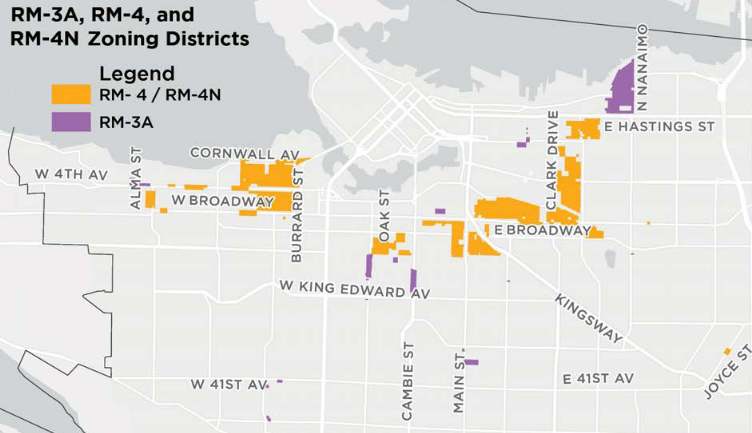
Apr 20, 2021: City Council votes for blanket rezoning
Following two nights of public hearings, Vancouver City Council voted April 20, 2021 to increase density for non-profit housing in select areas of the city without the requirement for individual public hearings.
Council threw its unanimous support (with only Coun. Colleen Hardwick abstaining) behind an amended proposal that will allow non-profit operators to build to six storeys with even less density than proposed by staff, in the RM-3A, RM-4, and RM-4N zones within parts of Kitsilano, Fairview, Mount Pleasant, Grandview-Woodland, and Marpole.
Throughout the hearing, non-profit operators urged Council not to stop at six (the current zoning is four storeys) but approve heights of up to 10 storeys. Rather than give the operators greater height — which would have meant another public hearing — Coun. Sarah Kirby-Yung followed a suggestion by Senior City Planner Dan Garrison and put forth an amendment to increase the floor space ratio (FSR) from 2.5 to 3.0. The change will result in approximately two extra units per floor, according to Senior Development Planner, Paul Cheng, but would result in less outdoor space.
One contentious issue brought up by neighbours, speakers, and some Councillors, was the City’s misleading definition of social housing. Staff said the intent of the amendment is to provide more affordable housing by increasing density in non-profit owned units where 100% of the building is reserved for social housing. What staff failed to mention is that 100% of the social housing constitutes only 30% of a building’s units. The rest (70%) are market rental.
Many non-profit operators praised the amendment, while other supporters said the zoning change does not go far enough, suggesting the entire city be thrown open to blanket rezoning for social housing, particularly “elitist” neighbourhoods such as West Point Grey.
Those opposed had serious concerns about the amendment, including the undemocratic nature of pre-approved zoning; the lack of notification of the public hearing; no community input; precedent-setting heights for the areas; the City’s misleading definition of social housing; and the potential destruction of many existing, affordable three-and four-storey housing complexes in the areas.
Vancouver resident David Webb, a long-time Main Street resident who lives in a low-rise rental apartment, told Council he could not find the equivalent monthly rent of $800 for housing anywhere else in the city. “Renters deserve some respect,” he said. “These people need the homes they already have.” Webb called the amendment “an existential threat” to renters in the area.
Attempting to quash fears, Coun. Peter Fry characterized the changes as “a modest proposal.” Pre-approved zoning, he said, would save operators time and money and speed redevelopment by cutting “red tape,” such as the cost of individual public hearings. Fry, however, acknowledged the new measures could have unintended consequences that the City must watch for, such as creeping rent increases that could make the new housing less affordable than the existing older apartments, built between 1970 and 1990.
Coun. Jean Swanson noted that the three top priorities of the Vancouver Plan are about addressing the lack of affordable housing in Vancouver. “We must get housing out of the speculative market,” said Swanson.
In her closing comments, Coun. Colleen Hardwick told her colleagues that the amendment side-steps the democratic process, warning it will further erode trust in government by “the people who elected us. Residents have the right to be heard,” she said. Hardwick was surprised that City staff lacked the knowledge on projected average rents for new social units, and how the change in land use to social housing, together with added height and density, would affect land values and affordability.
The blanket rezoning would treat all existing targeted buildings the same, with no ability to recognize important differences in age, condition, remaining life expectancy, number of tenants, renters’ histories, cost of rentals, amenities, or the capacity to undergo upgrades without the need for demolition. Under the proposal and its amendments, everything deemed old is under threat of demolition. And not only do residents of these buildings have no say in their future, Council never even bothered to inform them of its plans.



No Comments